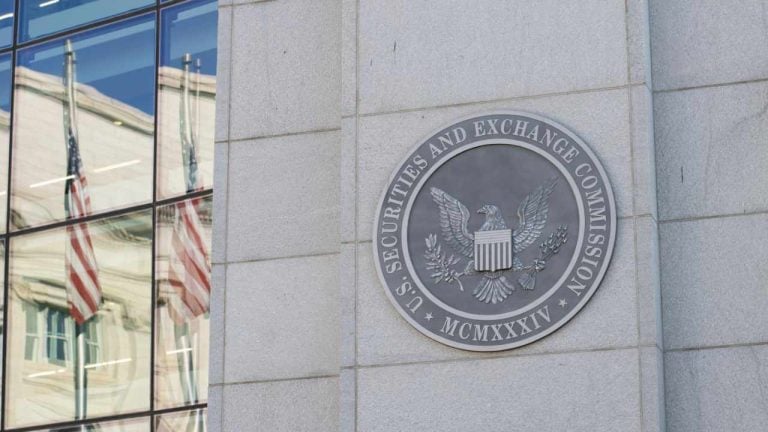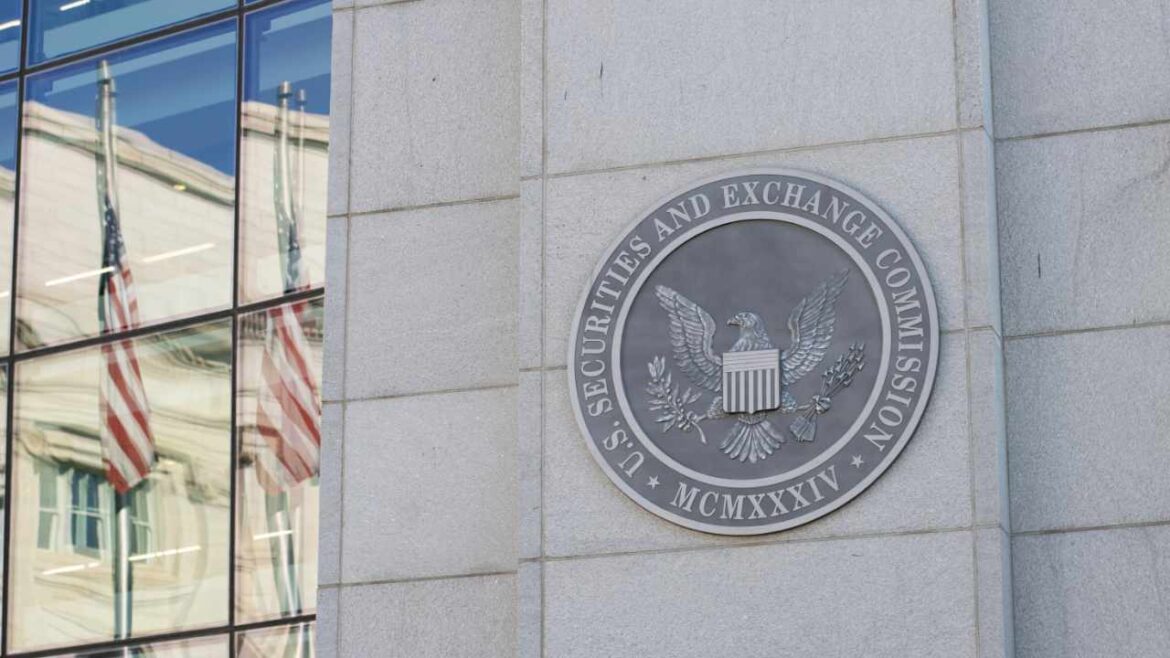 The U.S. Securities and Exchange Commission (SEC) has submitted its 2025 budget request, which will partly fund the securities watchdog’s efforts to regulate the crypto sector. “We’ve seen the Wild West of the crypto markets, rife with noncompliance,” SEC Chair Gary Gensler stressed. “As the cop on the beat, we must be able to meet […]
The U.S. Securities and Exchange Commission (SEC) has submitted its 2025 budget request, which will partly fund the securities watchdog’s efforts to regulate the crypto sector. “We’ve seen the Wild West of the crypto markets, rife with noncompliance,” SEC Chair Gary Gensler stressed. “As the cop on the beat, we must be able to meet […]
Source link
requests
Coinbase Appeals SEC’s Decision on Crypto Rules, Requests Judicial Review
Coinbase described the SEC’s actions in its appeal letter as arbitrary and capricious, an abuse of discretion, and contrary to law, in violation of the Administrative Procedure Act.
Cryptocurrency exchange Coinbase Global Inc (NASDAQ: COIN) is continuing its efforts to ensure the introduction of a clear regulatory framework for cryptocurrencies in the United States. Coinbase has filed an appeal, challenging the Securities and Exchange Commission’s (SEC) decision on its petition to introduce a unified rulebook for digital assets classified as securities in the country.
SEC Rejects Coinbase’s Request for Crypto Rule
On December 15, the SEC rejected Coinbase’s request for virtual asset rules on the grounds that the petition “lacked text or the substance of any proposed rule.” According to the regulator, the textual substance is a crucial requirement for such petitions.
The financial watchdog further stated the current securities laws already apply to the crypto securities market. Therefore, there is no need to introduce separate rules to govern the emerging economy.
SEC chairman Gary Gensler disagreed with the Coinbase proposal, which claimed that the current laws are unworkable. He also said there is no evidence to support Coinbase’s claim that crypto investors and issuers should be exempted from existing securities laws.
Shortly after the SEC’s decision was made known to the public, Coinbase filed an appeal the same day, requesting the judicial review of the judgment. On Monday, December 18, the US Third District Court of Appeals instructed the SEC to submit a record of its decision by January 24, 2024 for review.
Arbitrary and Capricious
In the appeal letter, Coinbase detailed the lengthy process it took to ensure the SEC responded to its petition. On different occasions, the authorities had delayed decisions on the Coinbase petition regarding introducing a unified rulebook for cryptocurrencies. However, Coinbase pressed on, calling the agency to respond to its petition.
Coinbase described the SEC’s actions in its appeal letter as “arbitrary and capricious, an abuse of discretion, and contrary to law, in violation of the Administrative Procedure Act.” The company also said the refusal goes against the agency’s principle of fundamental fairness.
“The Commission’s refusal to engage in rulemaking, even while it continues a campaign of regulation by enforcement against Coinbase and others that exceeds its statutory authority, flouts the APA [Administrative Procedure Act] and fundamental principles of fairness it embodies,” Coinbase said.
Coinbase Unveils Pro-Crypto Policy Campaign
Coinbase started its fight for crypto rules in the United States last year. The publicly traded company filed the petition for the rejected proposal in July 2022, asking the SEC to “propose and adopt rules to govern the regulation of securities that are offered and traded via digitally native methods, including potential rules to identify which digital assets are securities.”
The move follows the SEC’s decision to regulate the crypto industry through enforcement without providing a sufficient framework to determine the issuance and usage of digital assets in the US.
In June of this year, the SEC brought a civil lawsuit against the exchange, alleging violations of several securities laws, including selling products and services without proper authorization.
In response to the government’s crackdown on cryptocurrencies, Coinbase introduced Crypto435, a grassroots political campaign that advocated for pro-crypto policies in the United States.
The initiative is focused on expanding the crypto advocacy community and Coinbase said it will provide essential tools and resources for those involved in the campaign for effective communication across all 435 congressional districts in the country.
next
Cryptocurrency News, News
You have successfully joined our subscriber list.
Gemini files brief in lawsuit against SEC, requests to keep it simple
Cryptocurrency exchange Gemini has filed a reply brief as part of its efforts to dismiss the lawsuit it is facing against the United States Securities and Exchange Commission (SEC).
The lawsuit alleges that Gemini Earn — a service enabling customers to lend crypto assets like Bitcoin (BTC) to Genesis — breached securities regulations by offering unregistered securities.
According to Aug. 18 court documents filed in the U.S. District Court for the Southern District of New York, Gemini argued that the SEC has failed to make a clear claim.
“Section 5 of the securities act is not hard to understand,” the filing stated while arguing that the SEC has not clearly pointed out the requirements for claiming a violation of the act:
“The fact that the SEC cannot decide what is the security at issue only underscores the weakness of its position.”
It further argued that the court shouldn’t tackle the “convoluted analyses” presented by the SEC, and the agency should pose straightforward questions to determine whether it qualifies as a security.
It prompted questions including: When was the alleged security sold? Who was the buyer? Who was the seller? What price was offered or charged?

Gemini also contended that the SEC must highlight the unregistered security first, then identify the sale or offer to sell that security. It claimed the SEC had not fulfilled this.
“However, the SEC has not met that burden, and its opposition avoids the question before the court,” the filing stated.
Related: SEC lawsuits: 68 cryptocurrencies are now seen as securities by the SEC
On May 27, Gemini argued in a court filing that transactions carried out within the Gemini Earn program were essentially loans, requesting that the SEC dismiss the complaint.
On Aug. 19, Jack Baugham, a founding partner of JFB Legal, which represents Gemini, made a statement on X (formerly Twitter), suggesting that the SEC is changing its argument as the lawsuit goes on.
“The SEC is floundering. They can’t even decide what the security is,” Baugham stated, highlighting the confusing nature of the regulator’s argument:
“On the one hand, they claim that the Loan Agreement was a security. On the other hand, they claim that the entire Gemini Earn program was itself a security — an argument absurd on its face.”
Magazine: Deposit risk: What do crypto exchanges really do with your money?
SEC’s requests have not been limited to the discovery of Binance’s custody, security and availability of customer assets alone.
Binance has filed for the court to grant it a protective order against the United States Securities and Exchange Commission. This follows after the financial regulator has made several attempts to lay its hands on all of Binance’s documents that may have anything to do with customer assets.
Binance Takes Issues with SEC’s Multiple Requests
According to the August 14 filing, Binance suggested that the regulator’s requests are more like undertaking a “fishing expedition”.
Recall that in June, Binance agreed to a Consent Order with the SEC. This was after the regulator initially attempted to freeze all of its assets, citing concerns over the safety of customer funds.
The exchange now believes that, while it has worked tirelessly in line with that same order, the SEC may have misunderstood the essence of it in the first place. Part of the filing reads:
“BAM has worked in good faith, but the SEC has been steadfast in its belief that the Consent Order gives it carte blanche to investigate every aspect of BAM’s asset custody practices without any discernible limitation whatsoever.”
Binance also claims that since the June order, it has handed over information about customer assets to the SEC. And while the SEC is yet to find any evidence of misuse, the request still feels ‘inappropriate’ in that it has no bearing on the ongoing suit.
But the requests have not been limited to the discovery of Binance’s custody, security, and availability of customer assets alone. Binance claims that the SEC is also requesting all communications dating as far back as November 2022 for topics that seemingly have no relevance to customer assets.
And, lastly, the regulator is also asking the exchange to produce six of its employees, including CEO Changpeng Zhao (CZ), for deposition. Interestingly, Binance claims that it has offered the depositions of senior employees in positions that are directly associated with customer funds. However, so far, the SEC has appeared unimpressed about the offer.
Defending its top executives and the decision to produce other employees for the deposition, Binance says:
“They do not have unique firsthand knowledge about the facts surrounding the security, custody, and transfer of customer assets.”
Details About the Protective Order
Overall, there are three major things that Binance seeks to achieve with the protective order, if it’s granted. It hopes to limit the SEC to deposing four employees that would not include CZ or the exchange’s chief financial officer. The order would bar the SEC from asking questions beyond matters outside of the order. And, lastly, it would also stop requests for communications about things not related to customer assets.
next
Binance News, Blockchain News, Cryptocurrency News, News

Mayowa is a crypto enthusiast/writer whose conversational character is quite evident in his style of writing. He strongly believes in the potential of digital assets and takes every opportunity to reiterate this.
He’s a reader, a researcher, an astute speaker, and also a budding entrepreneur.
Away from crypto however, Mayowa’s fancied distractions include soccer or discussing world politics.
You have successfully joined our subscriber list.
What is CryptoSlate Alpha?
A web3 membership designed to empower you with cutting-edge insights and knowledge. Learn more ›
Connected to Alpha
Welcome! 👋 You are connected to CryptoSlate Alpha. To manage your wallet connection, click the button below.
Oops…you must lock a minimum of 20,000 ACS
If you don’t have enough, buy ACS on the following exchanges:
Connect via Access Protocol
Access Protocol is a web3 monetization paywall. When users stake ACS, they can access paywalled content. Learn more ›
Disclaimer: By choosing to lock your ACS tokens with CryptoSlate, you accept and recognize that you will be bound by the terms and conditions of your third-party digital wallet provider, as well as any applicable terms and conditions of the Access Foundation. CryptoSlate shall have no responsibility or liability with regard to the provision, access, use, locking, security, integrity, value, or legal status of your ACS Tokens or your digital wallet, including any losses associated with your ACS tokens. It is solely your responsibility to assume the risks associated with locking your ACS tokens with CryptoSlate. For more information, visit our terms page.
Terraform Labs requests to subpoena docs from bankrupt FTX in SEC case defense
Terraform Labs (TFL), the developer of the failed Terra blockchain, wants to subpoena bankrupt FTX for relevant documents it could use to defend its case against the U.S. Securities and Exchange Commission (SEC), according to a July 19 court filing.
In February, the SEC sued the blockchain developer and its former CEO, Do Kwon, alleging that their fraudulent activities and market manipulation led to the collapse of Terra/LUNA tokens.
However, the firm has consistently maintained that the Terra USD (UST) depeg was caused by a “coordinated ‘short’ attack by third parties” who targeted the stablecoin and its ecosystem, causing around $40 billion in losses.
To prove its case, the Terra blockchain developer wants FTX to provide documents showing wallet addresses, trading accounts, and records of transactions involving the “sales/offers of large volumes of cryptocurrencies” it developed, including UST and LUNA.
The firm specifically stated that it wants FTX to release Jump Trading wallets showing its trades of UST and LUNA between May 1 and May 31, 2021, and May 1 to May 31, 2022. Additionally, it wants the bankrupt firm to produce other short sellers’ trading accounts and wallets between March 1 to May 31, 2022.
“This evidence is in the Debtors’ possession, custody, and/or control. TFL seeks information from the centralized FTX International and US Exchanges about wallets used by Jump Trading LLC to trade UST or LUNA on these exchanges.”
Chris Amani, TFL’s new CEO, also filed a supporting motion arguing that publicly available order book information showed that short sellers used FTX-related accounts to submit massive sell orders at the beginning of the attack on UST. Amani added:
“Publicly availably blockchain data also shows that wallets identified as involved in the attack transferred the proceeds of their sales of UST to FTX exchange deposit wallets.”
As a result, TFL wants the Bankruptcy Court to allow it to subpoena documents from FTX International and its U.S. subsidiary, FTX US. If granted, the firm wants the immediate release of these documents because its trial would begin by November 30.
The post Terraform Labs requests to subpoena docs from bankrupt FTX in SEC case defense appeared first on CryptoSlate.
Blackstone Announces Major Asset Liquidations As Redemption Requests For Its REIT Continue

Blackstone real estate investment trust (BREIT), which recently made news for exercising a clause that restricted owner withdrawals for several consecutive months, has not taken the news lying down. Blackstone’s opportunistic funds recently announced the sale of $3.1 billion worth of its industrial real estate portfolio. It also is rumored to be considering a sale of its Las Vegas portfolio.
Strength in the Industrial Sector
Although much of the real estate market has suffered this year, industrial and warehouse is still a subsector where there has been year-on-year growth. Blackstone is selling 70 assets out of its opportunistic funds to Prologis Inc. The deal includes roughly 14 million square feet and marks the continuation of a long-standing relationship between Blackstone and Prologis.
The sale, which is expected to be complete by the end of the second quarter, would be the latest in more than a dozen deals between Prologis and Blackstone in the last 11 years. All indications are that Prologis plans to buy and hold the assets, which would add 77 new customers to a portfolio that includes 50 customers.
More importantly, the deal points to continued resilience in the industrial/warehouse sector, even as many other commercial sectors stumble in this new environment. As of April, the national average lease rate for industrial space hit $7.18 per square foot — 7% higher than the price a year ago. Perhaps that’s why an estimated $12.6 billion worth of industrial real estate was sold in the first four months of 2023.
Nadeem Meghji, Head of Blackstone Real Estate Americas, said, “Where you invest matters, and this transaction demonstrates the exceptional demand for high-quality warehouses. With near record low vacancy, logistics remains a high conviction theme for us; we are proud owners of $100 billion of warehouses in North America and $175 billion in total around the world. And, of course, Prologis is a world-class company that knows this space as well as anyone.”
Check out:
Is Blackstone Looking To Raise More Money?
It’s no secret that Blackstone has been restricting owner withdrawals in its REIT for almost the entire year. With that in mind, it’s not hard to imagine it is under tremendous pressure to liquidate assets. Rumors are circulating that Blackstone may sell half of the $4.25 billion interest it acquired in the Bellagio Resort & Casino in Las Vegas in 2019.
If true, it would represent the liquidation of an asset that is performing well. The Bellagio is one of the more profitable operations on the Las Vegas Strip. It’s also still under the control of the owner who opened it — MGM Grand — and in the middle of a long-term lease. Those factors make Blackstone’s share an appealing asset that will likely have many suitors if it decides to put it on the market.
Blackstone has steadily been selling its casino assets in the last several years. It sold the Cosmopolitan hotel for $5.65 billion in 2021, which netted the company a profit of nearly three times its original investment. At the time, it was one of the most profitable transactions of its kind in history. In 2022, Blackstone sold 49.9% of its ownership of MGM Grand and Mandalay Bay.
What This Means For Real Estate Investors
Despite being one of America’s largest landlords, Blackstone is still navigating choppy waters. The fund is liquidating assets, but the reasons are not totally clear. All real estate funds sell properties, and these could have just reached the end of their investment cycles.
Or it could be a case of Blackstone trying to liquidate some high-dollar assets before interest rates go up again, which will make these types of properties more difficult to liquidate in the future.
There is a kernel of wisdom here for everyday investors. First, Blackstone will eventually bounce back and so will the real estate market. Second, the industrial and warehouse sector of real estate remains strong, as evidenced by the fact it has delivered increased returns for investors year on year.
A Blackstone spokesperson said, “BREIT continues to deliver strong performance given its portfolio concentration in sectors like rental housing, logistics and data centers in the Sunbelt: 12% annualized net return since inception over six years ago, over 3x the public REIT index. We were pleased to see June repurchase requests decline meaningfully from the January peak.”
If you’ve been looking to make a real estate investment but you’re spooked by the market, industrial and warehouse assets or REITs in the industrial/warehouse sector are worth considering. There is always opportunity in up or down markets if you know where to look.
Read next:
Don’t miss real-time alerts on your stocks – join Benzinga Pro for free! Try the tool that will help you invest smarter, faster, and better.
This article Blackstone Announces Major Asset Liquidations As Redemption Requests For Its REIT Continue originally appeared on Benzinga.com
.
© 2023 Benzinga.com. Benzinga does not provide investment advice. All rights reserved.
Democrat lawmaker requests SEC, Treasury feedback over Republican-led crypto bill
Congresswoman Maxine Waters requested the SEC and the Treasury Department to submit in writing their views and feedback on a recently submitted legislative proposal related to regulating digital assets.
The letters were issued on June 26 and addressed to Treasury Secretary Janet Yellen and SEC chair Gary Gensler and pertained to the Digital Asset Market Structure Discussion Draft.
Waters — who is a Democrat and a ranking member of the House Financial Services Committee — requested the two authorities to provide an analysis of the proposed legislation and their impact on the current regulatory landscape.
Additionally, Waters requested the authorities to determine whether the proposed legislation is needed to regulate the digital asset industry and whether there are any conflicts with the recommendations made by the Treasury Department and the Financial Stability Oversight Council.
Waters also requested the authorities to determine if altering current laws would be a better option to ensure financial stability and protect consumers engaging with digital assets.
Details on the bill
The bill in question was introduced by Republican lawmakers on June 2 and is set to go through voting in July.
It primarily seeks to establish a framework that will determine whether a cryptocurrency is a commodity or security and separate the regulation of each digital asset class.
The bill also intends to establish clear roles for regulators in supervising the crypto sector — the SEC would be in charge of cryptocurrencies that are deemed securities, while the CFTC will oversee cryptocurrencies considered to be commodities in digital form.
Additionally, it blocks the expansion of exchange rules to non-exchange services like wallet provision, software publishing, and node operation.
The bill is being led by House Financial Services Committee chair Patrick McHenry and House Agriculture Committee chair Glenn Thompson, along with support from Congressmen French Hill and Dusty Johnson.
The post Democrat lawmaker requests SEC, Treasury feedback over Republican-led crypto bill appeared first on CryptoSlate.
Blockchain Assoc. requests info on Prometheum over ‘suspicious’ approval

United States crypto lobby group Blockchain Association has filed a request with the U.S. Securities and Exchange Commission, seeking information about the formerly little-known crypto company Prometheum.
The company became the center of the crypto industry’s attention this week when its CEO Aaron Kaplan testified at a House hearing and gave its support of regulating crypto under securities laws and the SEC, a position that’s starkly opposite to other vocal proponents of the industry.
On June 15, Blockchain Association counsel Marissa Coppel said the group filed a Freedom of Information Act (FOIA) request to the SEC seeking documents and communications related to Prometheum.
In a series of tweets, Coppel said she was “suspicious” that Prometheum was approved as a special purpose broker-dealer (SPBD) for digital assets “in the midst of aggressive SEC enforcement.”
Coppel was also skeptical at how Kaplan was able to provide testimony at a congressional hearing on regulations for the industry.
2/ The CEO somehow gets a seat in front of Congress and argues that Prometheum represents the compliant path for digital assets.
And they’ve paid $1.5+ million in sales commissions to a Chinese-affiliated entity with quite the regulatory track record.
Hmmm
— Marisa Tashman Coppel (@MTCoppel) June 15, 2023
FOIA requests are submissions by members of the public to U.S. federal agencies that can ask for records on any topic, in this case, the SEC’s information on Prometheum.
At the June 13 House hearing Kaplan said his firm did not receive any “additional exemptive relief from the SEC” when questioned by Representative Mike Flood.
For those that didn’t stick around until the end of the @FinancialCmte hearing today, this exchange between @USRepMikeFlood and @PrometheumInc CEO Aaron Kaplan is an absolute must-watch.
Flood explicitly lays out why Prometheum’s claims that their SPBD approval is evidence of a… pic.twitter.com/yCDDKHiLea
— Alexander Grieve (@AlexanderGrieve) June 13, 2023
Former SEC and FINRA staff
Meanwhile, others have raised suspicion over the background of the Prometheum team, noting that some are former SEC and Financial Industry Regulatory Authority (FINRA) staffers.
Prometheum’s chief compliance officer, Joseph Zangri, was an SEC enforcement attorney in the mid-to-late 1990s. In addition, the company’s chief regulatory officer, Rosemarie Fanelli joined the company in May 2021 after a nearly 14-year stint in senior roles at FINRA — a self-regulatory organization for the U.S. securities industry.
The co-founders and co-CEOs of Prometheum — Aaron and Benjamin Kaplan — also have a small degree of separation from former SEC staff. The Kaplans are attorneys at the law firm Gusrae Kaplan, which states it was established “by a former Chief Attorney of the SEC’s Division of Enforcement.”
Who look alot like these guys: pic.twitter.com/bcu4sgcv7s
— Matt Walsh (@MattWalshInBos) June 14, 2023
Gusrae Kaplan co-founder Martin H. Kaplan is also a Prometheum chairman.
It is not out of the ordinary for crypto companies to hire former regulatory staffers, however.
Following a lawsuit from the SEC, Binance.US hired former SEC enforcement co-director George Canellos as a lawyer. The newly appointed chief legal officer of stablecoin issuer Circle has a resume spanning many government roles including the U.S. Treasury and the Commodity Futures Trading Commission.
Magazine: Peter McCormack’s Real Bedford Football Club puts Bitcoin on the map









